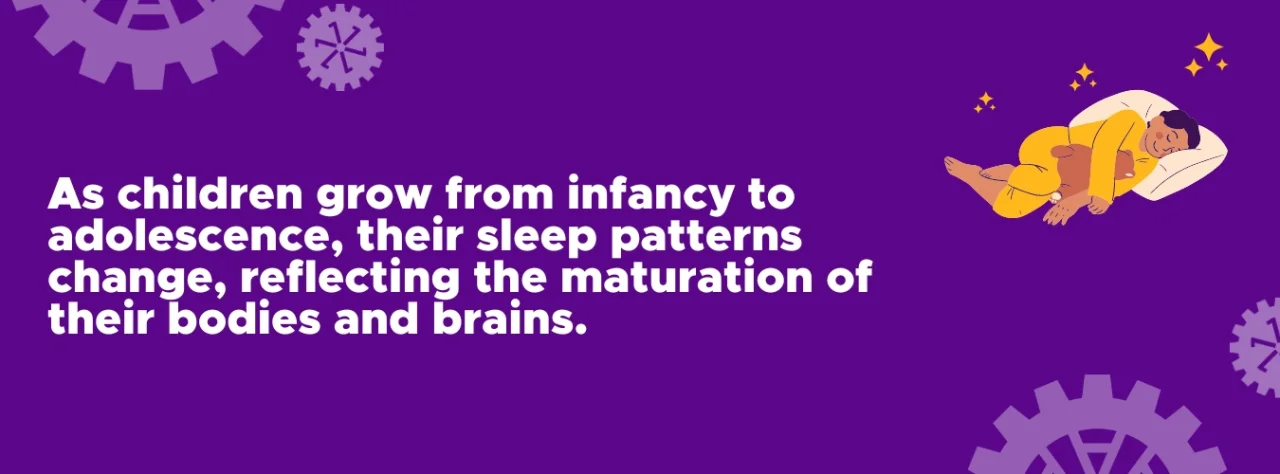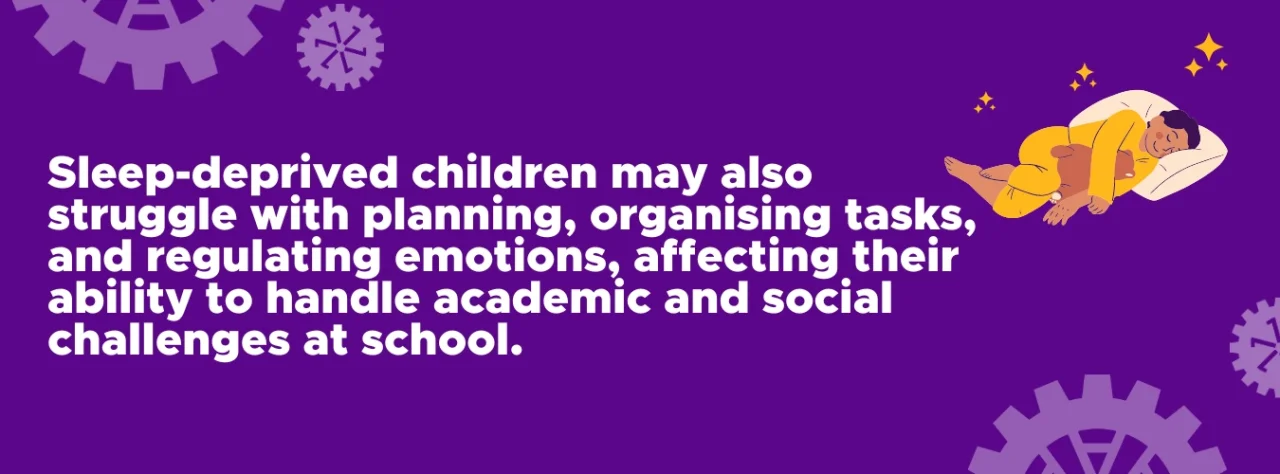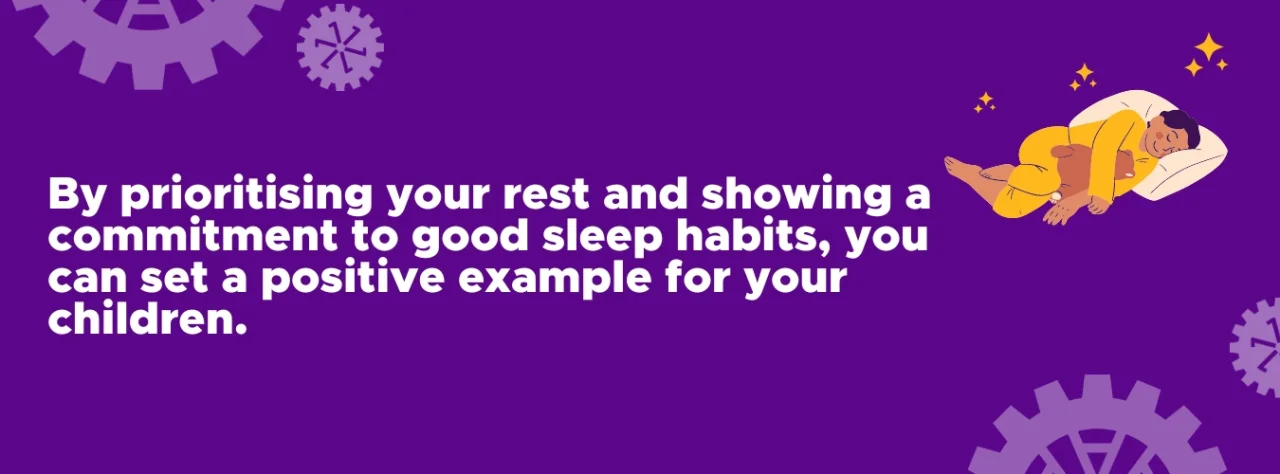12th August 2024
The Impact of Sleep on Learning: How Quality Rest Boosts Academic Performance
In the bustling world of childhood, filled with laughter, learning, and growth, one crucial aspect often gets overlooked: sleep.
Many view sleep as simply a break from the day's activities, a time to rest and recharge. However, sleep is far more significant; it’s a cornerstone of a child’s development, profoundly influencing their physical, cognitive, and emotional well-being. In this blog, we’ll explore how quality sleep supports healthy development and lays the foundation for academic success.

Understanding Sleep for Children
During sleep, a child’s brain is incredibly active, engaging in processes that are crucial for learning and cognitive development. REM sleep, in particular, is vital for consolidating new information, strengthening memories, and preparing the brain for future learning. This stage also plays a key role in synaptic pruning, which refines neural connections and enhances overall brain function.
Quality sleep is fundamental to healthy development, serving as the foundation for physical, mental, and emotional growth. Physically, sleep aids in the release of growth hormones, which are essential for the development of muscles, bones, and organs. Mentally, it boosts cognitive functions, such as improving memory consolidation, problem-solving skills, and creative thinking. Emotionally, it helps build resilience and regulate emotions, allowing children to handle daily challenges more effectively.
The Brain, Learning, and Development
During sleep, a child’s brain is incredibly active, engaging in processes that are crucial for learning and cognitive development. REM sleep, in particular, is vital for consolidating new information, strengthening memories, and preparing the brain for future learning. This stage also plays a key role in synaptic pruning, which refines neural connections and enhances overall brain function.
Quality sleep is fundamental to healthy development, serving as the foundation for physical, mental, and emotional growth. Physically, sleep aids in the release of growth hormones, which are essential for the development of muscles, bones, and organs. Mentally, it boosts cognitive functions, such as improving memory consolidation, problem-solving skills, and creative thinking. Emotionally, it helps build resilience and regulate emotions, allowing children to handle daily challenges more effectively.

Impact of Sleep on Academic Performance
There is a clear link between sleep quality and academic performance. Studies show that children who get ample high-quality sleep tend to have better attention, problem-solving abilities, and overall academic performance compared to their peers who are sleep-deprived. Insufficient sleep can make it difficult for children to focus, absorb new information, and retain what they’ve learned, potentially leading to lower grades and struggles with understanding school material.
Children who lack enough sleep might also face challenges with planning, organising tasks, and managing their emotions, which can affect their ability to tackle academic and social obstacles at school. By fostering healthy sleep habits early, parents can help their children excel both academically and socially. Key strategies include setting consistent bedtime routines, creating a sleep-friendly environment, and maintaining age-appropriate sleep schedules.
Sleep Duration
The amount of sleep a child needs varies by age. According to the Academy of Sleep Medicine:
- Infants (4-12 months): 12-16 hours per day, including naps
- Toddlers (1-2 years): 11-14 hours per day
- Preschoolers (3-5 years): 10-13 hours per day
- School-aged children (6-12 years): 9-12 hours per day
- Adolescents (13-18 years): 8-10 hours per day
Tips for Promoting Healthy Sleep Habits in Children
Here are some practical steps parents can take to support their child’s sleep health:
- Establish a consistent bedtime routine: Activities like reading a bedtime story, taking a warm bath, or practising relaxation techniques can signal to children that it’s time to wind down.
- Create a sleep-friendly environment: Ensure the sleep space is dark, quiet, and comfortable, free from distractions that might disrupt rest.
- Limit screen time before bed: Avoid stimulating activities before bedtime to help children transition into sleep more easily and improve sleep quality.
Leading by Example
Parents can also model healthy sleep habits. Children often imitate their parents, so setting a bedtime routine for the whole family can underscore the importance of sleep. By prioritising your own rest and demonstrating a commitment to good sleep practices, you set a positive example for your children.

The Importance of Sleep for Development and Success
The influence of sleep on children’s development and academic success is immense. Recognising the role of quality rest in cognitive function, emotional regulation, and overall well-being can help parents support their children’s growth in every aspect of life.
How NumberWorks’nWords Can Help
At NumberWorks’nWords, we recognise the significance of academic success. Our tailored tuition boosts confidence and results, complementing schoolwork and aligning with the curriculum to help students achieve their academic goals. To find out how NumberWorks’nWords can support your child, get in touch with our team or book a free assessment and introductory lesson today.
.
More news articles
18th February 2026

The Stress-Free Guide to Learning Times Tables
Read more3rd February 2026

How NumberWorks’nWords Helps Children Reset After the Holidays
Read more18th January 2026

How to Reset Routines After the Christmas Holidays
Read more5th December 2025

How to Prevent the Christmas Holiday Learning Slide
Read more